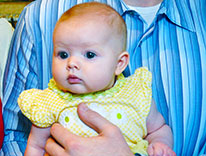Long-Term Benefits of Nurse Home Visits for New Mothers and Infants
CU School of Medicine Nov 20, 2019
AURORA, Colo. – Home visits by nurses to check on infants and first-time mothers offer learning benefits for the children and savings in the cost of public welfare programs, according to new research published in December 2019 issue of the journal Pediatrics.
Researchers from the University of Colorado Anschutz Medical Campus, University College London (UCL), and the University of Rochester evaluated the long-term effects of nurse home visiting programs. The initial visits were conducted in June 1990 and continued for over many years. The studies follow up on families 18 years after they participated in the nurse-visit program and they compare outcomes for those families with control groups.
“It’s rare for studies of early invention programs to examine early-intervention effects over an 18-year period,” said David Olds, PhD, professor of pediatrics at University of Colorado School of Medicine and one of the lead investigators of the studies.
“This early intervention, Nurse-Family Partnership, produced long-term improvements in the cognitive functioning of 18-year-old youth born to mothers who had limited
personal resources to cope with the adversities of living in deep poverty,” Olds said. “This new evidence shows promise that Nurse-Family Partnership’s effects may carry over into adulthood.”
Among the findings:
- Improved cognitive function and academic performance of 18-year-olds born to high-risk mothers with limited psychological resources to cope with poverty. Outcomes included improved math achievement scores, receptive language abilities, working memory, and ability to accurately read others’ emotions. Nurse-visited children were three times as likely to graduate from high school with honors compared to the control group
- Savings of $17,310 per family in public benefit costs, with reduced expenditures for Medicaid, the Supplemental Nutrition Assistance Program (SNAP), and welfare cash assistance. The reduction in the cost of public benefits is explained in part by nurse-visited mothers being better able to plan for subsequent pregnancies. In comparison, the visiting nurse program costs were $12,578 per family, resulting in a net savings of $4,732 per family.
- Working with high-risk mothers improved the mothers’ economic self-sufficiency and strengthened their families. Nurse-visited mothers, in comparison with mothers in the control group, were more likely to get married, had higher rates of co-habitation, and a greater sense of confidence in their ability to managed the challenges in their lives.
Gabriella Conti, PhD, UCL Economics and Social Sciences and co-author on the studies, said, “We now have evidence from the largest-ever longitudinal evaluation of the U.S. Nurse-Family Partnership, demonstrating that nurse home visits are clearly beneficial for young mothers and their children.”
The studies followed 742 low income first-time mothers, primarily African-American, and their children, who were part of the Nurse-Family Partnership program in Memphis, Tenn., from June 1990 through to September 2014. Eighty-five percent were living in households below the federal poverty level and in highly-disadvantaged neighborhoods.
Olds is a child-development expert who began sending nurses into the homes of poor mothers in Emira, N.Y., in the 1970s, and later into homes in Memphis and Denver. The nurses taught mothers child-rearing skills.
Olds is the first author of the study, “Prenatal and Infancy Nurse Home Visiting Effects on Mothers: 18-Year Follow-up of a Randomized Trial.” There are nine co-authors on that article, including Michael D. Knudtson, MS, and Christian Hopfer, MD, from the University of Colorado.
Harriet Kitzman, PhD, from the University of Rochester School of Nursing is the first author of the second article, “Prenatal and/or Infancy Nurse Home Visiting and 18-Year Outcomes of a Randomized Trial,” Thirteen co-authors are listed including Olds, Knudtson, and Hopfer from the University of Colorado.
About Nurse-Family Partnership
Nurse-Family Partnership ® changes the future for the most vulnerable babies born into poverty by giving a first-time mom trusted support from her own personal nurse throughout the first 1,000 days, from pregnancy until her child’s second birthday. The program is backed by over 40 years of scientifically-proven outcomes for both mom and baby, and currently serves over 38,000 moms in 41 states, the U.S. Virgin Islands and many Tribal communities. Nurse-Family Partnership is headquartered in Denver, Colorado. Follow NFP on Twitter @NFP_nursefamily, Facebook at facebook.com/nursefamilypartnership and Instagram at www.instagram.com/nursefamilypartnership/.
About the University of Colorado School of Medicine
Faculty at the University of Colorado School of Medicine work to advance science and improve care. These faculty members include physicians, educators and scientists at UCHealth University of Colorado Hospital, Children’s Hospital Colorado, Denver Health, National Jewish Health, and the Veterans Affairs Eastern Colorado Health Care System. The school is located on the Anschutz Medical Campus, one of four campuses in the University of Colorado system.
